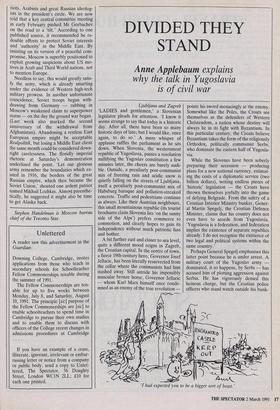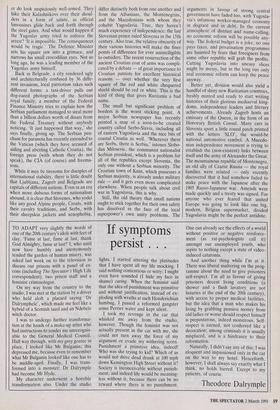DIVIDED THEY STAND
Anne Applebaum explains
why the talk in Yugoslavia is of civil war
Ljubljana and Zagreb `LADIES and gentlemen,' a Slovenian legislator pleads for attention. 'I know it seems strange to say that today is a historic day. After all, there have been so many historic days of late; but I would like, once again, to do so.' A mere whisper of applause ruffles the parliament as he sits down. When Slovenia, the westernmost republic of Yugoslavia, passes a resolution nullifying the Yugoslav constitution a few minutes later, the cheers are barely audi- ble. Outside, a peculiarly post-communist mix of freezing rain and acidic snow is quietly falling on the streets of Ljubljana, itself a peculiarly post-communist mix of Habsburg baroque and pollution-streaked concrete. Traffic and pedestrians continue as always. Like their Austrian neighbours, this small mountainous republic (its tourist brochures claim Slovenia lies 'on the sunny side of the Alps') prefers commerce to commotion, and clearly hopes to gain its independence without much patriotic fuss and bother.
A bit further east and closer to sea level, quite a different mood reigns in Zagreb, the Croatian capital. In the centre of town, a fierce 19th-century hero, Governor Josef Jellacic, has been literally resurrected from the cellar where the communists had him stashed away. Still astride his impossibly muscular bronze horse, Governor Jellacic — whom Karl Marx himself once conde- mned as an enemy of the true revolution — points his sword menacingly at the enemy. Somewhat like the Poles, the Croats see themselves as the defenders of Western Christendom, a nation whose destiny will always lie in its fight with Byzantium. In this particular century, the Croats believe Byzantium takes the form of the religiously Orthodox, politically communist Serbs, who dominate the eastern half of Yugosla- via.
While the Slovenes have been soberly preparing their secession — producing plans for a new national currency, estimat- ing the costs of a diplomatic service (two billion dollars), writing endless pieces of `historic' legislation — the Croats have thrown themselves joyfully into the game of defying Belgrade. From the safety of a Croatian Interior Ministry bunker, Gener- al Martin Spegelj, the Croatian Defence Minister, claims that his country does not even have to secede from Yugoslavia. `Yugoslavia is a federation, and federation implies the existence of separate republics already. I do not recognise the existence of two legal and political systems within the same country.'
Perhaps General Spegelj emphasises this latter point because he is under arrest. A military court of the Yugoslav army dominated, it so happens, by Serbs — has accused him of plotting aggression against Serbia. He has vigorously denied this heinous charge, but the Croatian police officers who stand watch outside his bunk- had expected you to be a bigger sort of beast.' er do look suspiciously well-armed. They hike their Kalashnikovs over their shoul- ders in a form of salute, as official limousines glide back and forth through the steel gates. And what would happen if the Yugoslav army tried to enforce the arrest? 'It is impossible. The consequences would be tragic.' The Defence Minister sets his square jaw into a grimace, and narrows his small crocodilian eyes. Not so long ago, he was a leading member of the Yugoslav army himself.
Back in Belgrade, a city rendered ugly and architecturally confused by 36 diffe- rent invasions, local patriotism takes such different forms: a taxi-driver pulls out dog-eared photographs of the Serbian royal family; a member of the Federal Finance Ministry tries to explain how the Serbian parliament managed to steal more than a billion dollars worth of dinars from the Federal Treasury without anybody noticing. 'It just happened that way,' she says finally, giving up. The Serbian pen- chant for paranoia has recently extended to the Vatican (which they have accused of aiding and abetting Catholic Croatia), the foreign press (with whom they do not speak), the CIA (of course) and freema- sons.
While it may be tiresome for disciples of international stability, there is little doubt that Ljubljana, Zagreb and Belgrade are capitals of different nations. Even in an era when more dubious forms of nationalism abound, it is clear that Slovenes, who yodel like any good Alpine people, Croats, with their cavalry traditions, and Serbs, with their sheepskin jackets and xenophobia, differ distinctly both from one another and from the Albanians, the Montenegrins, and the Macedonians with whom they cohabit Yugoslavia. True, they haven't much experience of independence: the last Slovenian prince ruled Slovenia in the 15th century. Also true, the relative obscurity of their various histories will make the finer points of difference for ever unintelligible to outsiders. The recent resurrection of the ancient Croatian coat of arms was compli- cated by a debate — of great importance to Croatian patriots for excellent historical reasons — over whether the very first square of the red and white chequered shield should be red or white. This is the kind of thing that gives Ruritania a bad name.
The small but significant problem of borders is the worst sticking point. A major Serbian newspaper has recently printed a map of a soon-to-be created country called Serbo-Slavia, including all of eastern Yugoslavia and the nice bits of coastal Croatia as well. 'Wherever there are Serbs, there is Serbia,' intones Slobo- dan Milosevic, the communist nationalist Serbian president, which is a problem for all of the republics except Slovenia, the only one without a Serbian minority. The Croatian town of Knin, which possesses a Serbian majority, is already under military rule — and it gets even more complicated elsewhere. When people talk about civil war in Yugoslavia, this is why. Still, the old theory that small nations ought to stick together for their own safety has dissolved in the face of the local superpower's own unity problems. The arguments in favour of strong central government have faded too, with Yugosla- via's infamous worker-managed economy in disgrace and in debt. In the current atmosphere of distrust and name-calling, no economic reform will be possible any- way. The federal budget is a joke, no one pays taxes, and privatisation programmes are haunted by fears that foreigners from some other republic will grab the profits. Cutting Yugoslavia into uneasy slices might be messy, but in the long run only real economic reform can keep the peace anyway.
Better yet, division would also yield a handful of shiny new Ruritanian countries, freshly minted and ready to start writing histories of their glorious mediaeval king- doms, independence leaders and literary achievements. Already Zagreb hosts an emissary of the Queen, in the form of an Honorary British Consul. Many cars in Slovenia sport a little round patch printed with the letters `SLO', the would-be national automotive symbol. A Macedo- nian independence movement is trying to establish the (non-existent) links between itself and the army of Alexander the Great. The mountainous republic of Montenegro, an old ally of Czarist Russia — the royal families were related — only recently discovered that it had somehow failed to make peace with the Japanese after the 1905 Russo-Japanese war. Amends were made quickly and a treaty was signed. For anyone who ever feared that united Europe was going to look like one big, modern, Belgian supermarket, divided Yugoslavia might be the perfect antidote.



















































 Previous page
Previous page